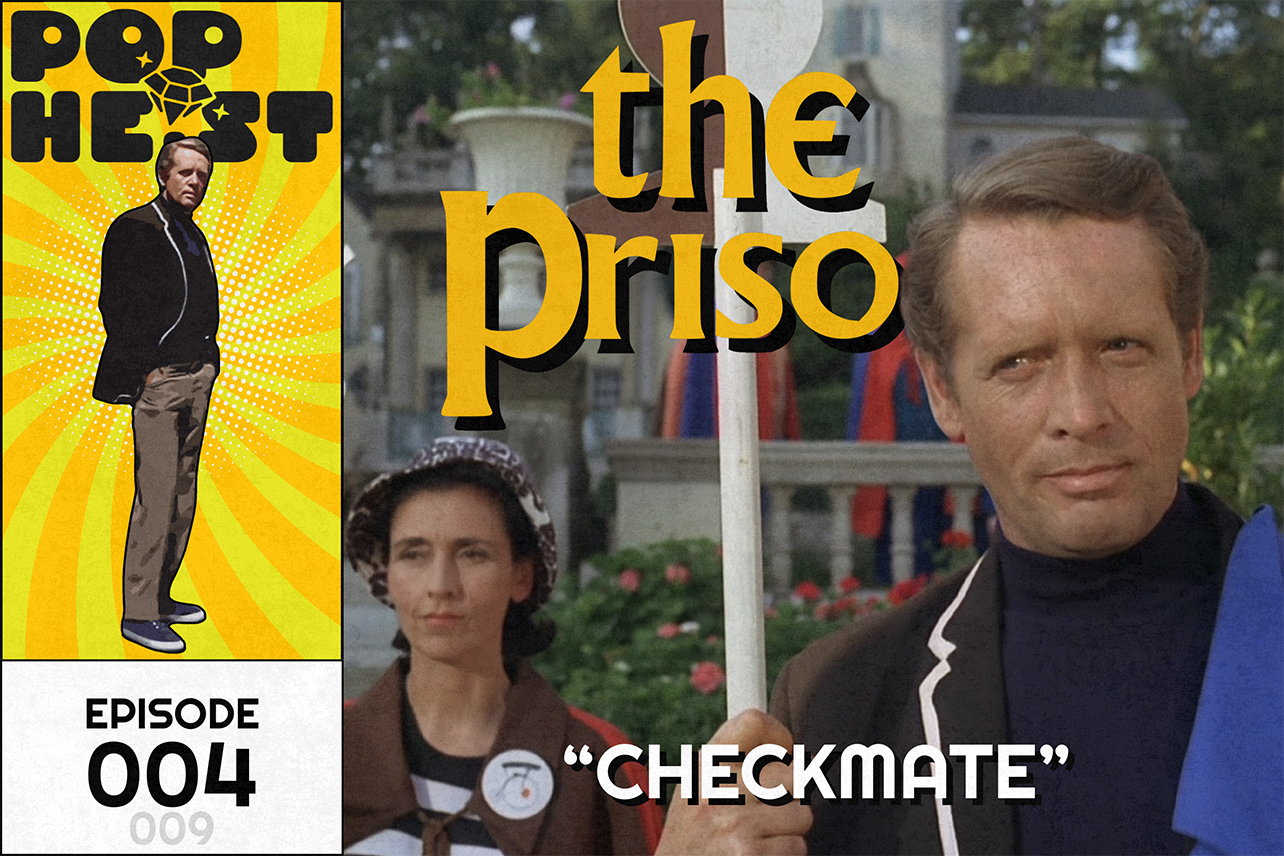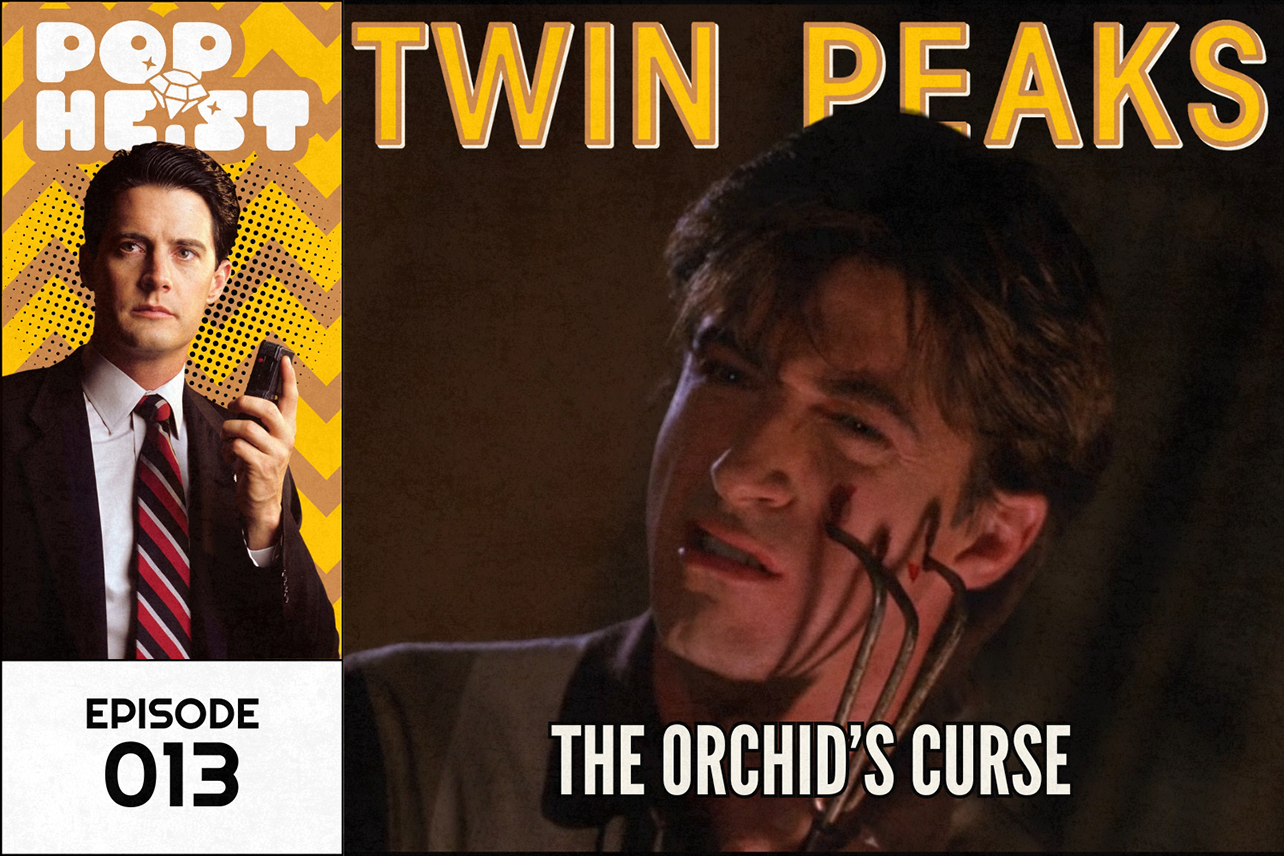In PRESTIGE PREHISTORY, Pop Heist critic Sean T. Collins takes a look at classic TV shows that paved the way for the New Golden Age of Television — challenging, self-contained stories from writers and filmmakers determined to push the medium forward by telling stories their own way.
The Prisoner Episode 9 (airdate order) / Episode 4 (AVC order)*
"Checkmate"
Original Airdate: Nov. 24, 1967
Writer: Gerald Kelsey
Director: Don Chaffey
Cast: Patrick McGoohan, Peter Wyngarde, Ronald Radd, Rosalie Crutchley, George Coulouris, Patricia Jessel, Denis Shaw
*NOTE: The Prisoner's proper running order is a matter of dispute; Pop Heist is using the AV Club order for the show
Number Six is his own worst enemy. But you don't have to take my word for it: just ask the administrators of the Village. For two episodes in a row now, they've used his own determination to smash the security of his prison and break free to drag him down deeper into their morass of mind games.
I think this is why Patrick McGoohan works so well in the role. Sure, he created the show, stars in it, wrote and directed several episodes, uses his own professional headshot for Six's dossier photograph, uses his birthdate for Six's right down to the second, et cetera. (This is partly why co-creatorship claims by McGoohan's collaborator, the writer and script editor George Markstein, strike me as exaggerated.)
But beyond that, he's developed a very physical style of acting that meshes well with the man of action he portrays. I've joked before that Six has three settings: lurk, lurch, and loom. His movements are sudden, almost erratic. Quick-cut editing makes them seem even choppier and more unpredictable. Even his style of hand-to-hand combat, which he's deployed in two episodes running now, is all stiff punches. This guy's gonna hit you till you fall down, full stop. He's gonna get where he's going at top speed. He's gonna get answers from the people he wants answers from even if he has to chase them down and pop out of the woodwork to grab them.
He's unstoppable, and that's his problem.
This episode's new Number Two (British style icon Peter Wyngarde), a comparatively young, fashionable person compared to the majority of his male predecessors in the position, need exert very little of his own youthful energy to ensnare Six this time. (He seems to spare that for meditation and karate, which we see him practice in a gi with a black belt.) All he has to do is sit back and allow the prisoner to be his own undoing.
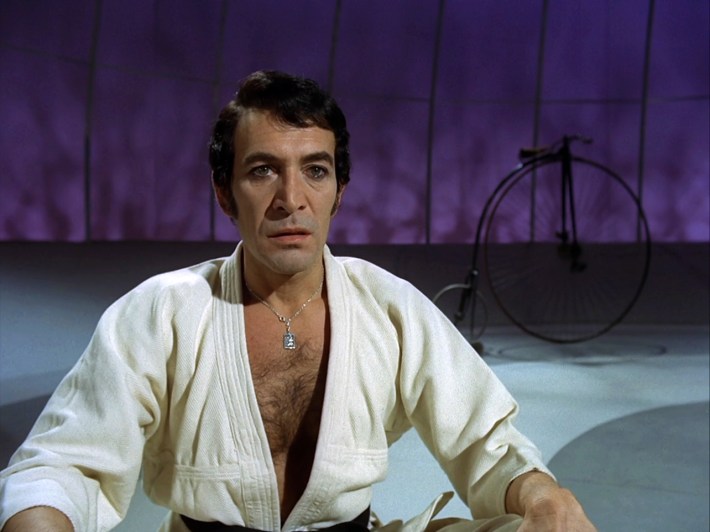
It all starts in a suitably troubling fashion. One morning, Rover, the security orb, comes roaring down the street. (John Bramall, the sound recordist, seems to be the person responsible for this sound, which is as blood-curdling in its own way as Godzilla's SKRREEEEEEEEEONNNNKK.) Rover's arrival freezes all the Villagers in their tracks lest the entity attack them. But one man, Number 14 (George Coulouris), seems immune from the procedure and keeps on walking as though nothing's going on. When there's no sign that Rover plans to attack him for this transgression. Six decides to follow him to see what he's up to.
He's up to a human game of chess, a hallmark of old-fashioned despotism. (Okay, so my only source for this claim is Mel Brooks's History of the World Part I, but still.) Assigned the role of queen's pawn, Six strikes up a conversation with the chatty queen herself, Number 8 (Rosalie Crutchley). But more useful to him still is the sight of one of the game's rooks, Number 58 (Ronald Radd), who makes an unauthorized move on his own and is hauled off to the sinister "hospital" for it. Such is the peril of belonging to "the cult of the individual," as the queen puts it.
But speaking with Number 14 after the game, Six figures out a way to find out who still belongs to that particular cult, i.e. who are the prisoners and who are the guards who've gone over to the enemy. ("Most of us join the enemy," 14 says matter-of-factly.) But 14 imparts an important message: You can tell who's who by careful observation and an understanding of psychology as plainly as you can tell the black pieces on the chessboard from the white ones.
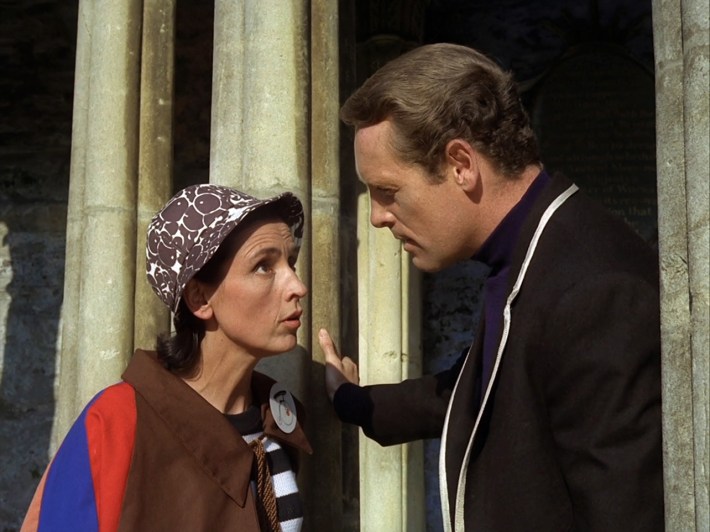
So Six seeks out the rogue rook after his stint in the Hospital, during which he's subjected to dehydration and electric shocks to condition him into submission. Turns out the procedure didn't quite take. Though frightened of Six's commanding demeanor, 58 reveals that he's been imprisoned — this is the first time we've actually heard a reason for a stay in the Village, if I recall correctly — because he invented an electronic defense system he attempted to distribute to all the world's governments to ensure peace. In the end, he says, the plans leaked anyway due to a "bumbling bureaucrat," but it's his intentions that troubled the masters of the Village. Six calls 58's actions "treason," but while he may not share the man's pacifism, he appreciates his rebellious spirit. This is the kind of person he can count on.
And how does he know? Because 58 follows orders. Bark at him loudly enough, Six finds, and he'll do what he's told out of fear of punishment. But the "prisoners" who are really guards do no such thing, even when asked to only slightly inconvenience themselves as a favor to Six. The only people who refuse orders around here, or give them for that matter, work for the Village. (File this information away, you'll need it in a minute.)
So with 58's help, Six devises his biggest and best escape plan to date. Six uses his insight to dig up several people he trusts are still prisoners — including the shopkeeper (Denis Shaw), whose foreign-language interactions with customers aroused Six's suspicions in the premiere.
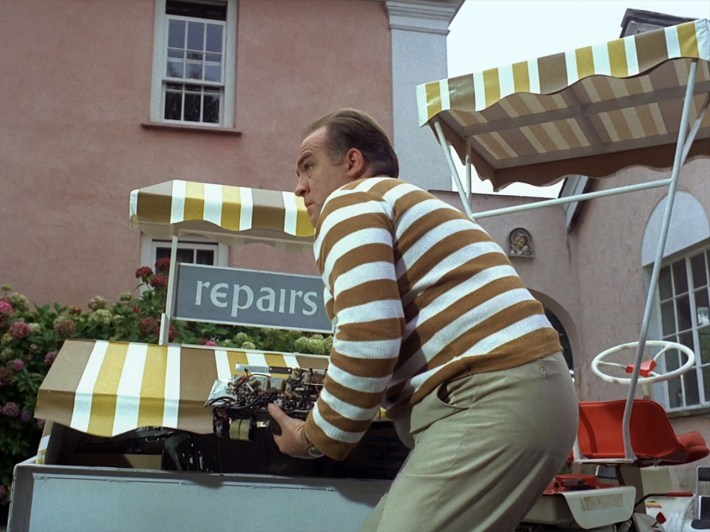
The plan is straightforward. Using stolen equipment reassembled by 58, Six radios a distress call to any passing vessels, posing as a crashed plane. The two men craft a raft by which 58 will sail out with the transmitter and rendezvous with the rescue ship, after which point Six and the rest of the gang, who infiltrate Number Two's Green Dome and subdue him with plans of capture, will join him aboard.
But all the while, the forces of the Village — most notably Number Two and Number 23, the doctor in charge of the rook's brainwashing (Patricia Jessel) — seem certain the plan will fail, even at times when they lose sight of Six. Only when our hero reaches the rescue boat and finds Number Two sitting pretty on a television monitor inside of it does he realize they were right, and he's been had.
And again, he only has himself to blame. The theory he developed on the advice of Number 14 — prisoners will follow orders, prison guards will not — can be applied by anyone, not just Number Six. Now, if you were the rook or the shopkeeper or the chessmaster or anyone else Six ropes into his scheme, you've just been told people who take charge work for the Village — and Six has taken charge. What else are you supposed to think?
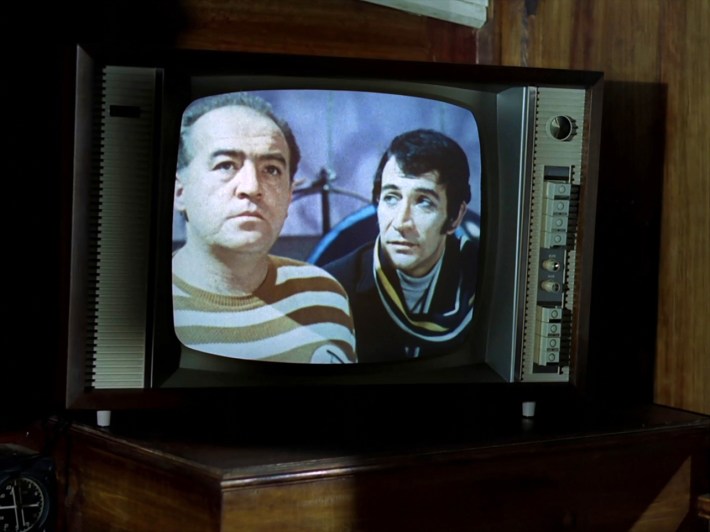
That's how things end this time. Number 58 has ratted Six out, and all the other members of the team have freed Number Two rather than holding him prisoner. It's devastating, less so for Six than for 58, the man who truly was used as a pawn to take this piece off the board. In fact, Number Two personally informs 58 that he made the wrong decision and that Six was a prisoner all along, seemingly just for the pleasure of making him feel bad.
But it's about more than that, of course: It's about getting you to stop trusting your fellow man, the members of your community, anyone but people in authority. In the queen's case, it even means not trusting your heart: Number 23 brainwashes her into falling in love with Six, and believing he's in love with her. She then gives the queen a transmitter in a locket that broadcasts her pulse rate, which naturally quickens when Six is around. She's a human alarm system, triggered by the most noble and sacred emotion we as humans can feel for one another — an emotion entirely fabricated and implanted in her brain by the village. (They do keep saying they have surefire ways of getting what they want out of Number Six, though they don't want to damage him the way they damage everyone else with such extreme mind-control techniques.)
What's amazing about The Prisoner is that even if you know next to nothing about the show, the concept, and what's to come, you can pretty much rest assured he's not escaping the Village in the fourth episode — and yet! The entire time he's working with the rook and gathering his small posse of fellow free-thinkers, you're rooting for them, goddammit. You want him to get the hell out of there. (I was gonna say "get off the Island," but wrong show.) You want the other poor bastards who are stuck there to snap out of it and split. You don't want to see the smug look on yet another Number Two's face as he or she puts Six in his place before the closing image for each episode: prison bars, superimposed both on the Village and on Six himself.
Yet here we are, all aboard the Village's bogus rescue ship, the MS Polotska, staring this smug dandy in the face through a television screen. Somehow, he did it. Somehow, he convinced the people he's brutalizing to trust him. Somehow, we've been fooled again.
This recap was originally accessible to paid subscribers only, and future recaps in this series are available now for paid subscribers. If you haven't already, consider supporting worker-owned media by subscribing to Pop Heist. We are ad-free and operating outside the algorithm, so all dollars go directly to paying the staff members and writers who make articles like this one possible.
